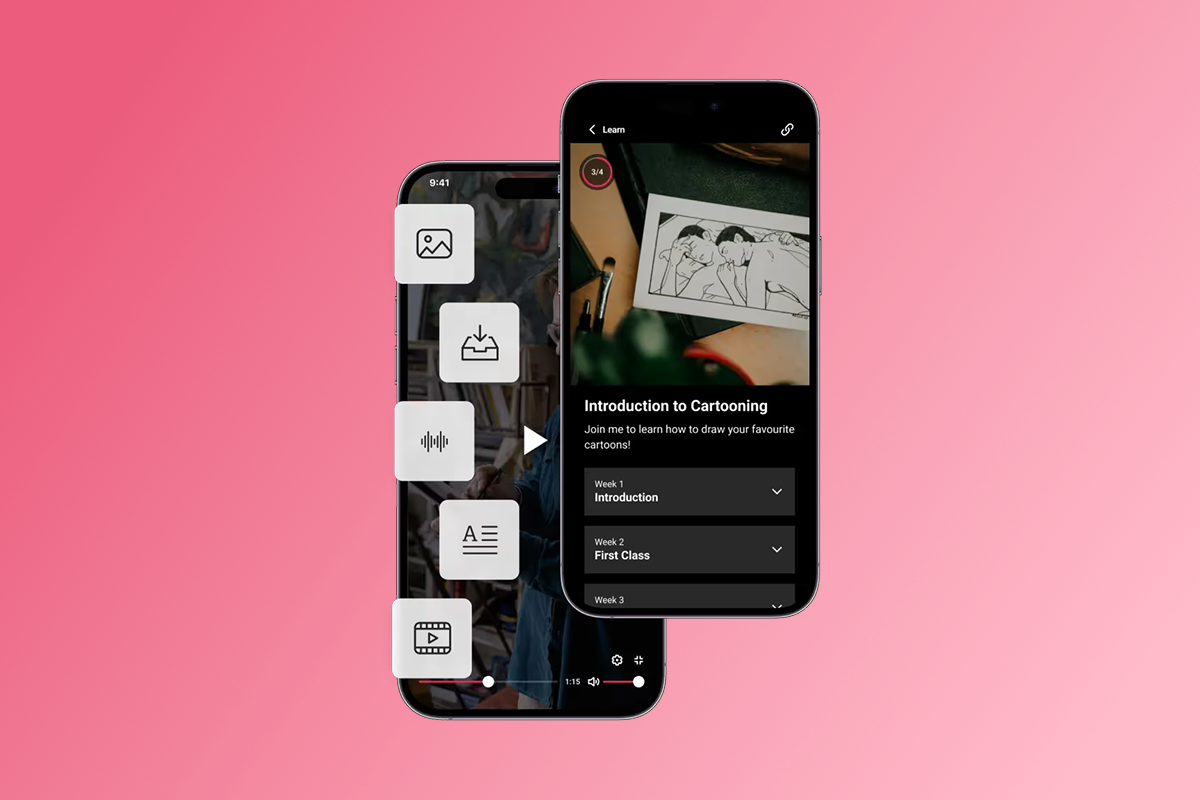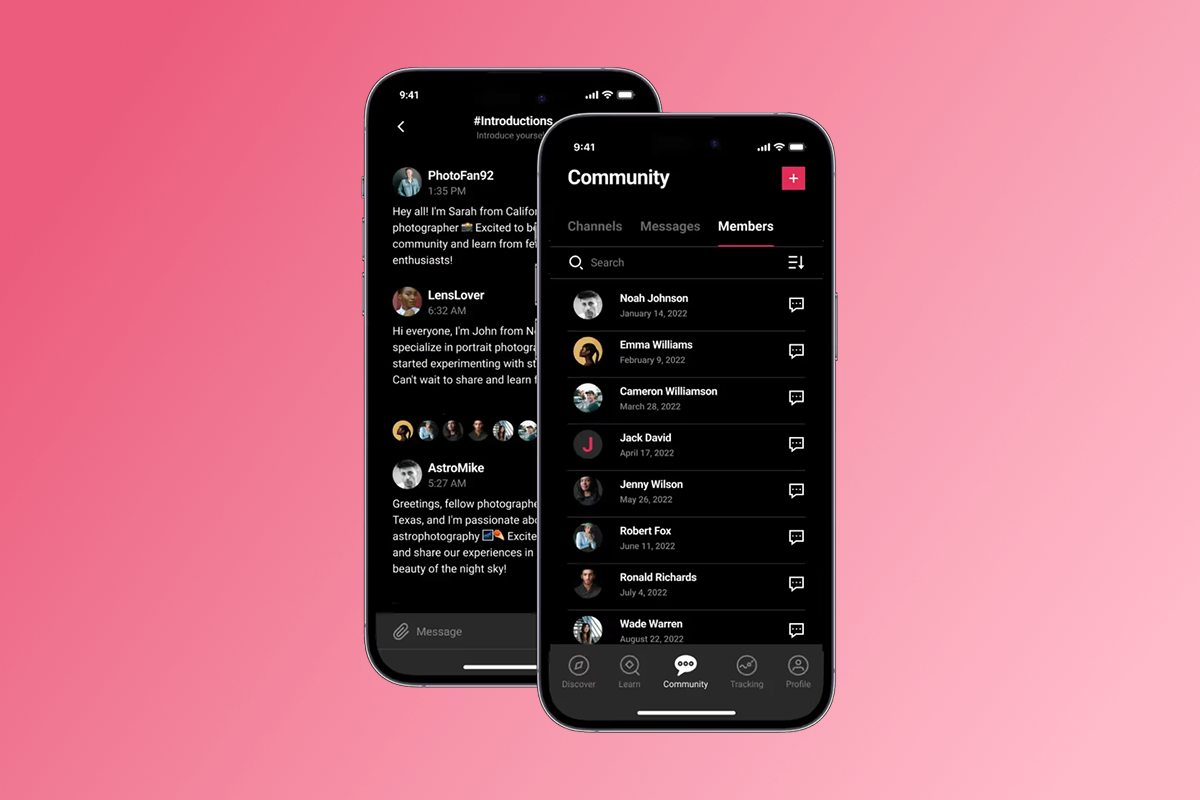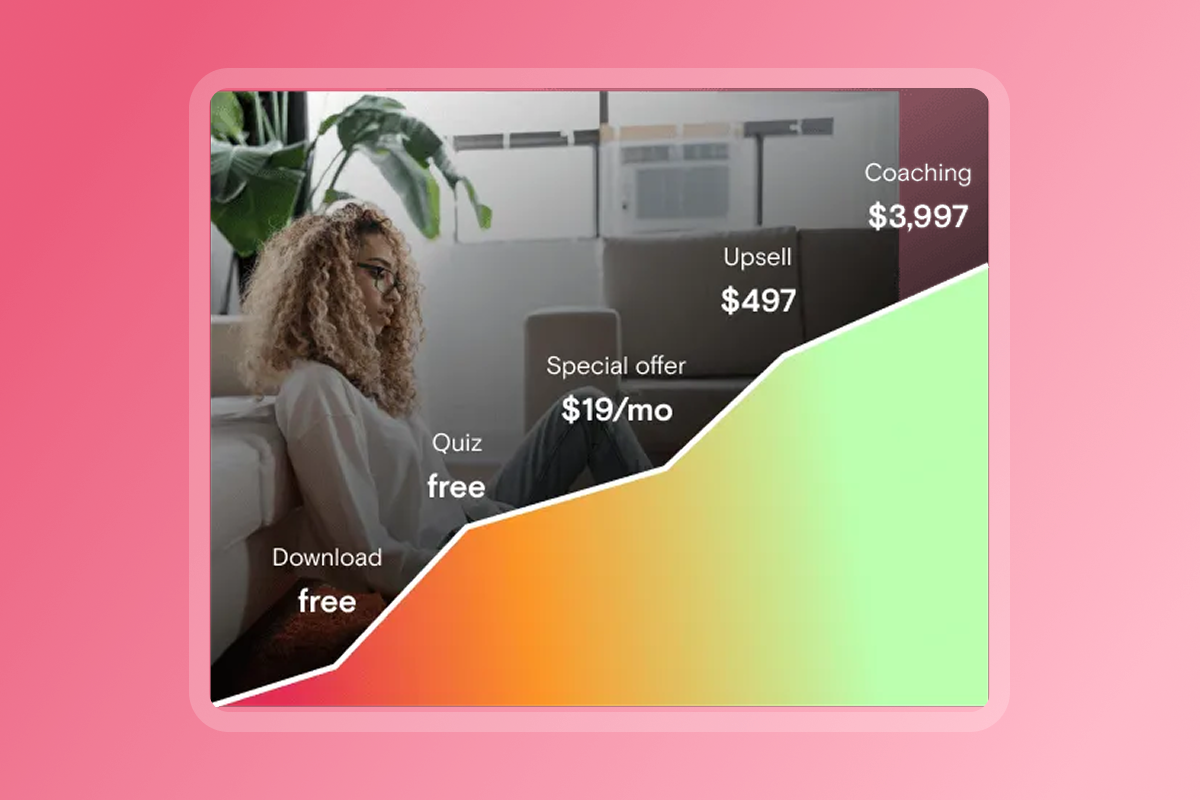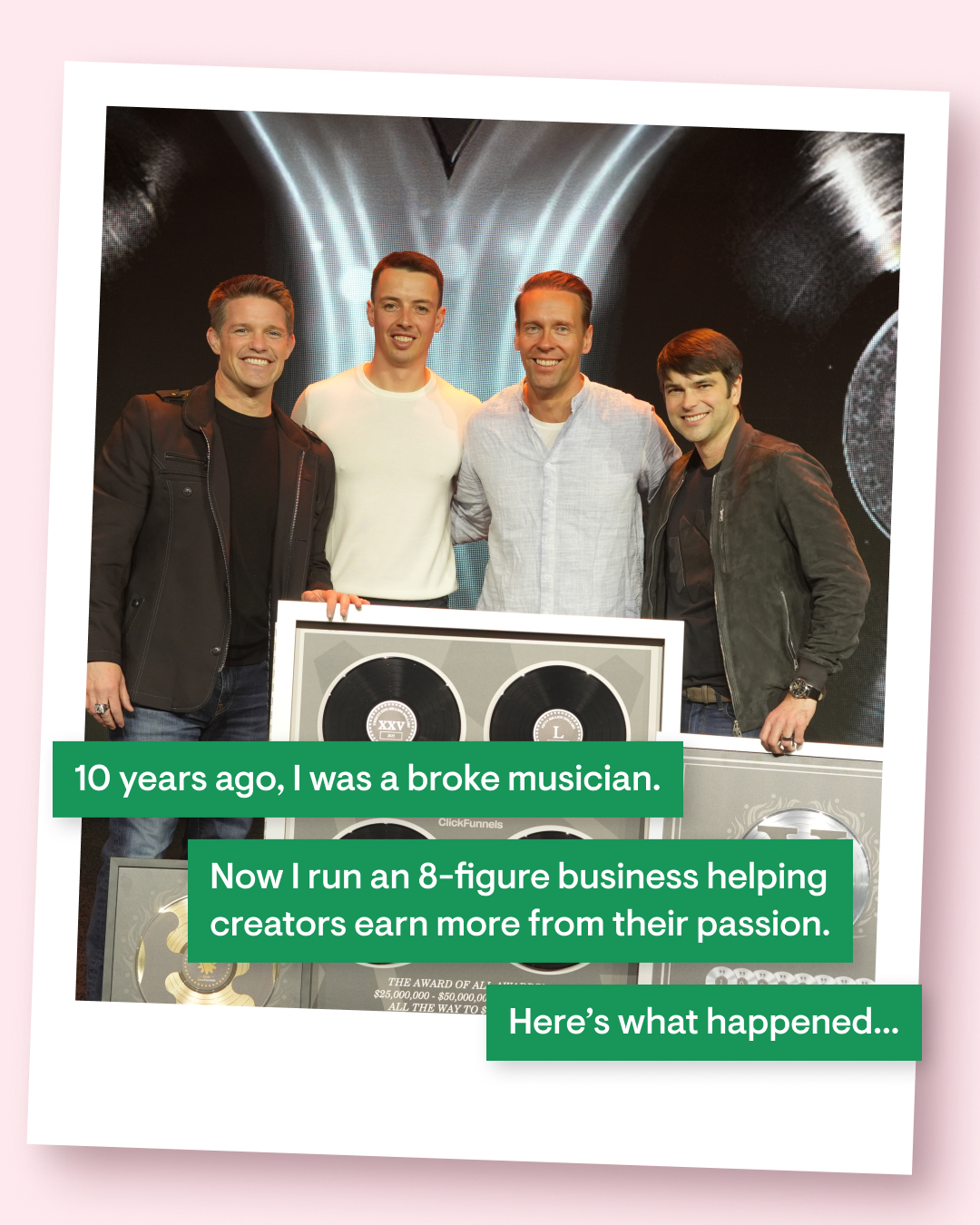Updated 24th November, 2025
Your professional job has given you skills worth six figures. The problem isn't your expertise, it's that no one has shown you how to package it, sell it, and own it outside of a performance review.
Most "make money online" guides push you toward learning Python or becoming a virtual assistant. That advice wastes your existing assets. The corporate professionals who are replacing their salaries online in 2025 aren't learning to code, they're repackaging their existing skills and teaching what they already know to others.
This playbook walks through seven high-income skills you can monetize online in 2025, realistic earning timelines, and the no-code path from "vague business idea" to "branded app with paying members."
Why your corporate skills are already high-income assets
We've seen the shift from "doing the work" to "teaching the method" become the fastest path from salary to recurring revenue for corporate professionals. Businesses pay premiums for strategy, systems, and clarity—the exact skills you use to survive 55-hour work weeks and endless Slack threads.
The global e-learning market will reach $842.64 billion by 2030 according to Grand View Research, and we're seeing the fastest growth in business skills, productivity systems, and wellness coaching, not technical training.
The difference between freelancing and building a product
Here's the trade-off most corporate professionals miss:
Freelancing is another job. An app is an asset. One creator described the shift this way:
"Passion makes building your own e-learning app fast, simple, and stress-free. With their no-code, drag-and-drop platform, I was able to design, build, and launch a fully functional app in just a few hours—no tech experience required." - Rob M., G2 review

The playbook below focuses on skills you can package into courses, challenges, and coaching programs inside a branded mobile app—so you build once and sell many times.
7 high-income skills you can monetize without code
Each skill below includes realistic earning potential, how to package it for an app-based business, and the corporate experience that transfers directly.
1. Digital marketing strategy (not implementation)
If you've ever written a go-to-market plan, run a campaign post-mortem, or explained why your team's metrics matter, you already do digital marketing strategy. In our experience watching successful creator-marketers, the highest earners in 2025 don't run Facebook ads themselves. They teach others how to choose the right channels, measure what matters, and allocate budget.
Earning potential:
- Freelance: Entry-level digital marketers earn around $25 per hour according to ZipRecruiter, or $50,000-$70,000 annually
- Productized: Experienced freelance digital marketers charge $50-$200 per hour, with annual incomes exceeding $100,000
How to package it with Passion:

Create a "Marketing Strategy Sprint" inside your app—a 4-week course walking small business owners through channel selection, budget planning, and performance tracking. Add weekly group coaching via Zoom integration and a community channel for Q&A. Corporate professionals in marketing roles can repurpose internal frameworks like quarterly planning templates into teachable systems.
Corporate skills that transfer: Go-to-market planning, campaign analysis, stakeholder reporting, budget allocation.
2. Copywriting and sales persuasion
Every internal memo, client pitch deck, and exec summary you've written is proof you can persuade with words. Copywriting for online businesses means writing landing pages, email sequences, and sales scripts that convert browsers into buyers.
Earning potential:
- Freelance: New copywriters charge $27-$30 per hour, or $0.05-$0.20 per word
- Productized: Experienced copywriters earn $75-$125 per hour, with per-word rates rising to $0.30-$0.50
How to package it with Passion:

Build a "Conversion Copywriting Toolkit" app with 10 short video lessons breaking down landing page structure, email hooks, and objection handling. Add downloadable templates (headline formulas, email swipe files) as PDFs inside each lesson. Push notifications can deliver a daily copywriting tip to keep members engaged between lessons, something email alone can't match.
Corporate skills that transfer: Persuasive writing, stakeholder buy-in, value proposition articulation, objection handling.
3. Project management and operations systems
If you've built a Gantt chart, wrangled a cross-functional team, or turned chaos into a repeatable process, you own a skill that solo entrepreneurs will pay a premium to learn. Project managers earn an average of $102,682 annually according to ZipRecruiter, but productizing this knowledge scales far beyond hourly billing.
Earning potential:
- Freelance: $50-$100+ per hour for project managers with 2-3 years of experience
- Productized: $5,000-$10,000/month selling systems training to 50-100 members at $99-$199/month
How to package it with Passion:

Create a "Systematize Your Business in 30 Days" challenge app. Record screen-share videos of how you set up project boards in Asana or Notion, broken into daily 10-minute lessons with one action step per day. Add goal-tracking inside the app so members can check off completed systems as they build them.
"I like that there's an easy to follow system to not only build your App but also your Business. It makes you think about the fundamentals of your business so that you can create an app that's suited for your clients' needs." - Emmely C., G2 review
Corporate skills that transfer: Process documentation, timeline management, resource allocation, stakeholder coordination.
4. Data analysis and business intelligence
You don't need to be a data scientist to monetize this skill. If you've pulled a report, spotted a trend, and explained what it means to non-technical stakeholders, you can teach small business owners how to measure what matters. SEO specialists, who rely heavily on data analysis, earn a median salary of $71,000.
Earning potential:
- Freelance: $75-$150+ per hour for data analysis and reporting strategy
- Productized: Monthly membership teaching "dashboard design" to 30-50 business owners
How to package it with Passion:
Build a "Data for Non-Data People" course with video walkthroughs showing how to set up Google Analytics, create a simple dashboard in Google Sheets, and identify the 5 metrics every online business should track weekly. Include templates as downloadable PDFs within each lesson. The mobile app advantage compounds here—members can check their metrics on their phone and immediately ask questions in the community without switching platforms.
Corporate skills that transfer: Reporting, data visualization, trend analysis, translating numbers into strategy.
5. Niche coaching (fitness, mindset, business skills)
Coaching is the fastest path from corporate expertise to recurring revenue, and you don't need a certification to start. If you've mentored junior employees, led team retrospectives, or helped colleagues solve problems, you already coach. The key is picking a specific niche—fitness habits for desk workers, confidence for mid-career women, time management for new managers.
Earning potential:
- Freelance: $100-$300 per session for 1-on-1 coaching
- Productized: $99-$299/month with 20-50 members = $2,000-$15,000 MRR
How to package it with Passion:

Launch a "30-Day Transformation Challenge" in your niche. Combine daily video lessons (10-15 minutes each) with accountability check-ins via the in-app community. Use push notifications to send daily prompts or motivational nudges. Fitness creators are seeing strong results with this model—our case studies show measurable improvements in completion rates when combining push notifications with in-app community accountability.
For a detailed walkthrough, this 12-minute Passion review shows three non-technical creators earning $5K-$15K/month and walks through their exact app setups.
Corporate skills that transfer: Mentorship, goal-setting frameworks, accountability systems, motivational communication.
6. Community management and engagement
If you've moderated a Slack channel, organized team events, or kept cross-functional teams aligned, you understand community management. Online businesses need engaged communities to reduce churn and increase lifetime value—but most founders don't know how to build or moderate one.
Earning potential:
- Freelance: $40,000-$50,000 annually managing communities for other brands
- Productized: $149/month with 30-50 creators = $4,500-$7,500 MRR
How to package it with Passion:
Create a "Build a Thriving Community" app with lessons on onboarding rituals, moderation best practices, engagement tactics (polls, challenges, spotlights), and community analytics. Use your own app's community feature as a live example—members experience good community management while learning it. The in-app community beats Facebook groups because your members never leave your branded experience, and push notifications bring them back when someone asks a question without competing with algorithm-driven feeds.
Corporate skills that transfer: Internal communications, culture-building, conflict resolution, engagement strategy.
7. Instructional design (teaching others to learn)
If you've onboarded a new hire, built training materials, or explained a complex process in a way that "just clicked," you have instructional design skills. The ability to structure information for maximum retention is a high-income skill because every course creator and corporate training team needs it.
Earning potential:
- Freelance: $50-$100 per hour
- Productized: $3,000-$8,000/month teaching 20-40 course creators at $149-$199/month
How to package it with Passion:
Build a "Course Design Accelerator" app teaching learning objectives, chunking content, active learning techniques, and assessment design. Include templates for course outlines and lesson scripts as downloadable resources. The platform's course creation tools let you model best practices while teaching them—use quizzes, drip scheduling, and completion tracking to demonstrate the techniques you're explaining.
"They lay it out clearly and are available for support. The platform is easy to use with clear directions on what to do next. The number of features available are amazing, right down to tracking integrations built right in." - Michele D. P., G2 review
Corporate skills that transfer: Training development, onboarding systems, process documentation, learning assessment.
How to learn these skills fast
You don't need a four-year degree or a $10,000 bootcamp to monetize these skills. Most corporate professionals already possess 60-80% of the required knowledge. The gap is learning how to package and sell it online.
Best platforms for fast skill acquisition
- Google Career Certificates (Digital Marketing, Project Management, Data Analytics): Google's professional certificates take 3-6 months at 10 hours per week. Cost: $39/month on Coursera.
- HubSpot Academy (Marketing, Sales, Customer Service): Free certifications in inbound marketing, content strategy, and sales. Time: 4-8 hours per certification.
- Coursera and Udemy (All Skills): Thousands of courses taught by industry practitioners. Cost: $15-$200 per course. Focus on courses with real-world projects you can add to your portfolio.
- YouTube (Free Skill Previews): Watch this 18-minute beginner's guide to Passion to understand the platform and see real creator examples before committing.
Realistic timelines to proficiency
Most corporate professionals can reach "proficient enough to sell" in 3-6 months by dedicating 5-10 hours per week. Research from productivity experts shows individuals often start earning consistent income within 3-9 months for skills like digital marketing and copywriting. The timeline compresses when you already have adjacent experience—a corporate project manager learning to teach project management online can launch in 4-8 weeks.
From skill to income: The no-code launch path
Once you've identified your skill and validated demand (by talking to 5-10 potential customers), the path to launch is structured and fast.
Step 1: Package your skill into a challenge or mini-course
Start small. Don't build a 50-hour masterclass. Build a 7-day or 30-day challenge that delivers one specific outcome.
Examples:
- "7-Day Email Copywriting Sprint" (Copywriting)
- "30-Day Operations Cleanup Challenge" (Project Management)
- "14-Day Data Dashboard Build" (Data Analysis)
Record 10-20 short video lessons (5-15 minutes each) on your phone or with Zoom. Write simple scripts. Focus on one actionable step per lesson.
Step 2: Build your branded app in Passion
The no-code builder eliminates the tech barrier that stops most corporate professionals.
- Week 1: Pick a template (fitness, business coaching, education), upload your logo, choose brand colors, and drag-and-drop your video files into lesson slots.
- Week 2: Set up pricing (monthly subscription at $99-$199, annual plan, or one-time purchase), configure web checkout (lower fees via PassionPayments at 3.9% + Stripe) or enable in-app purchases for mobile convenience (Apple/Google take 15-30%), and add push notification text for your launch sequence.
- Week 3: Submit your app to the Apple App Store and Google Play (Apple charges $99/year, Google charges $25 one-time). On Passion's Expand and Plus plans, submission support is included. Launch your web app immediately while app store reviews process (typically 1-3 weeks).
- Which plan to start with: Most corporate professionals building their first app should start with the Launch plan ($99/month annually) to validate demand with your first 10-30 members. Once you hit $3,000-$5,000 MRR and need app store submission support or advanced features, upgrade to Scale or Expand. Check current plan features and pricing before you start.
This step-by-step 18-minute tutorial covers the full setup process from signup to your first published lesson.
"Passion.io is super user friendly. I'm new to app development but the way the app is set-up causes my excitement to override my fear!" - Tiffany Jones, Trustpilot review
Step 3: Launch to a beta group
I've seen too many corporate professionals wait for perfection. Don't. Launch to your first 10-20 members—friends, former colleagues, or a small email list—at a discounted "founding member" rate ($49-$99). Use their feedback to refine lessons and fix friction points.
How to find your first 10 members:
- Use the LinkedIn networking strategies outlined in Fast Company to tap your existing professional network via personalized messages
- Offer free access in exchange for testimonials and feedback
- Post in relevant Facebook groups or online communities where your audience hangs out
Why an app beats a website for selling skills
The mobile-first engagement advantage is measurable. Industry research comparing email and push notifications shows email open rates average 15-25% for most industries, while push notification open rates hit 40-60% when done well.
When you send a push notification that says "Day 3 Challenge: Build your first dashboard," your members see it on their lock screen. When you send an email, it competes with 50 others in their inbox.
We've seen creators report higher completion rates with mobile apps. Combining push notifications with in-app community accountability drives measurable engagement improvements across our creator base.
For a detailed comparison, this 8-minute Passion vs LearnWorlds breakdown covers the mobile-first advantage and pricing differences.
Realistic earning potential and timelines
The path from $0 to salary replacement takes 12-24 months for most corporate professionals building a productized app business. Here's what the phases typically look like:
These numbers assume a $99-$199/month subscription model and 3-5% monthly churn. Research on affiliate marketing income patterns shows beginners earning $200-$500 per month within the first 3-6 months, which aligns with the timeline for app-based course businesses. Intermediate affiliate marketers earn between $1,000 and $10,000 per month in their first 1-3 years, providing a useful benchmark for productized app businesses.
Key milestone insights:
- Months 1-6 (Side Hustle Phase): Focus on validating demand, launching beta, refining your offer. Your first 10 paying members and first testimonial happen here.
- Months 6-12 (Replacement Income Phase): Scale to 50-100 members, optimize retention, add upsells. Target monthly churn below 5% and launch your first high-ticket offer (1-on-1 coaching or mastermind).
- Months 12-24 (Scale Phase): Systematize operations, hire support (VA or community manager), add passive income streams. Consistent $10k+ MRR for 3+ consecutive months signals you're ready for this phase.
"I feel like this could really be the freedom I've dreamed of." - Kate Parsons, Trustpilot review
What it actually costs to start
I want to be transparent about costs. The barrier to entry is low, but not zero. Here's a realistic budget for the first 12 months:
Software and tools:
- Passion subscription: $99-$599/month depending on plan. Start with Launch ($99/month annually) to test, upgrade to Scale or Expand as you grow.
- Apple Developer Account: $99/year
- Google Play Developer Account: $25 one-time
- Stripe payment processing: ~2.9% + $0.30 per transaction (industry standard)
Optional costs:
- Course creation tools: Free (record on Zoom or your phone) to $50/month (Descript for editing, Canva for graphics)
- Email marketing (pre-launch list building): $0-$50/month (Mailchimp, ConvertKit free tiers work initially)
Total first-year investment: $1,500-$5,000 depending on the plan and tools you choose.
Cost comparison: A custom-built app costs $30,000-$100,000+ and takes 6-12 months. Passion eliminates that barrier entirely by handling the technical infrastructure so you can focus on content.
Common mistakes corporate professionals make
Mistake 1: Waiting to feel "ready"
You already know more than your target audience. You don't need to be the world's top expert. You need to be two steps ahead of your customer and able to teach those two steps clearly.
Mistake 2: Pricing too low out of fear
Beginner copywriters start around $27-$30 per hour, while experienced professionals charge $75-$125 per hour. Your app-based course should be priced at $99-$299/month—not $19/month. I've watched dozens of corporate professionals underprice out of fear. Low prices signal low value and attract customers who churn fast.
Mistake 3: Ignoring mobile engagement
If you build a course website without a mobile app, you're missing the retention edge. Research shows mobile apps drive higher completion rates because push notifications and in-app communities keep users engaged between lessons.
"I love my passion app and this community! I appreciate so much the support on the journey to create my own app and my business!" - Åsa Lindstedt, Trustpilot review
Pick your skill and take the first step
You've spent years building skills that others will pay to learn. The gap isn't your expertise—it's the vehicle. Start with one skill from this list, outline a 7-day or 30-day challenge, record 10 short videos on your phone, and build your app in Passion.
The timeline from zero to $5,000/month is 6-12 months for corporate professionals who commit 10-20 hours per week. That's 12-24 months to replace a $60,000-$180,000 salary with a business you own—without algorithms, without gatekeepers, and without writing a single line of code.
Stop researching and start building. Try Passion's 30-day money-back guarantee to turn your corporate skills into a branded app business. The only thing between you and your first paying member is hitting publish.
Frequently asked questions
Do I need a degree or certification to make money online with these skills?
No. Your professional track record matters more than credentials, though certifications from Google, HubSpot, or Coursera can add credibility.
What's the easiest high-income skill to learn for beginners?
Digital marketing and copywriting have the shortest learning curves for corporate professionals because the fundamentals overlap with business communication skills you already use.
How much does it cost to start a no-code app business?
Plan for $1,500-$5,000 in year one. This includes Passion ($99-$599/month), Apple Developer Program ($99/year), Google Play ($25 one-time), and optional tools like Canva.
How long until I earn consistent income from an online skill?
Most creators start earning consistent income within 3-9 months for skills like digital marketing and copywriting. Consistent income typically means $1,000-$3,000 per month from 10-30 paying members.
Can I build an app-based business while working full-time?
Yes. Most corporate professionals dedicate 10-20 hours per week during months 1-6, recording lessons on evenings and weekends while still employed.
What's the difference between PassionPayments and in-app purchases?
PassionPayments processes web checkout transactions with a 3.9% platform fee plus Stripe's standard rates, while in-app purchases (IAP) on iOS/Android are more convenient for mobile users but Apple/Google retain 15-30%.
Key terms glossary
High-income skill: A specialized ability commanding $50-$200+/hour freelance rates or $5,000-$20,000+ MRR when productized into courses or coaching.
Productizing: Turning a service you deliver one-on-one (consulting, coaching) into a scalable product (course, app, membership) that you build once and sell to many customers.
No-code platform: Software using visual drag-and-drop interfaces instead of code, allowing non-technical users to build apps without hiring developers.
Recurring revenue (MRR): Monthly recurring revenue from subscriptions or memberships. A $99/month membership with 50 active members generates $4,950 MRR.
Churn rate: The percentage of members who cancel their subscription each month. Lower churn (2-3%) indicates strong retention and engagement.
Push notifications: Messages sent directly to a user's phone or device, even when the app isn't open, typically seeing 40-60% open rates compared to 15-25% for email.
In-app purchases (IAP): Transactions processed inside iOS or Android apps where Apple and Google charge 15-30% fees but offer a smooth checkout for mobile users.
Branded app: A mobile application published under your business name in the Apple App Store and Google Play Store, giving you full control over design, content, and customer relationships.
Drip schedule: Automated content delivery that releases lessons or modules on a set schedule (e.g., one lesson per day for 30 days) to improve completion rates and prevent overwhelm.





.png)








